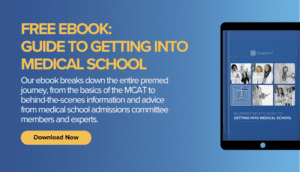Oftentimes, the hardest part of prepping for the MCAT is simply getting started. Many people don’t know how to start prepping for the MCAT. With the seemingly endless number of MCAT prep courses and free MCAT resources, it’s easy to get overwhelmed. Fortunately, with a little planning and foresight, figuring out where to start with MCAT prep can be a less daunting task.
Sign up to get expert tips and exclusive invites to free MCAT classes and medical school admissions workshops!
How to Start Prepping for the MCAT
1. Take A Diagnostic MCAT Exam
This should be everyone’s first step when deciding how to start prepping for the MCAT. A diagnostic practice MCAT is not your typical practice test. The objective isn’t necessarily to do well, but rather to gauge what your knowledge level is and establish a baseline. Regardless of how you do on the diagnostic, you can only go up from there! Get a free MCAT diagnostic test when you sign up for a free Blueprint MCAT account.
2. Decide What Your Goals Are
If you’re like most pre-meds, your ambition knows no bounds. It’s an admirable trait and has likely allotted you a hefty list of accomplishments. However, while everyone would like to receive a perfect score on the MCAT, not everyone needs to. Analyze your GPA, school list, and diagnostic MCAT score to determine what your goal MCAT score is. That’s the score you’ll be reaching for, but don’t restrict yourself to that. As long as you do your best, you’ll be on the right path!
3. Familiarize Yourself With The MCAT
Before you jump into MCAT prep, you should know what’s on the MCAT. Get familiar with the topics you’ll see on the test. It’s likely you’ve covered many of the concepts in your college classes, but it never hurts to go over them again, both as a refresher and to understand how the AAMC will present them on the MCAT.
One small thing to remember is the MCAT Verbal Reasoning Section is also referred to as the CARS section. So if you ever encounter something on Google or an old MCAT study guide about the MCAT Verbal Reasoning Section, just know it’s been renamed to the CARS.
4. Create A Study Plan
Once you take a diagnostic test, you should have a good idea of what areas, topics, and skills you need to work on. From there, it’s time to create an MCAT study plan. No two MCAT study schedules will look alike, since everyone has different strengths and goals. When creating yours, decide what days you can study and how much time you can devote to MCAT prep. Don’t forget to schedule MCAT practice exams and days off—self-care is critical for MCAT students.
5. Gather Your MCAT Prep Materials
Here’s the fun part! Some people gather different materials from across the stratosphere—or buy old MCAT books from friends. You’ll likely want to use MCAT flashcards to help organize all the content you need to know; we’ve written a guide on how to use Anki for the MCAT in case you want to use Anki decks too.
However, many people wonder if they should enroll in an MCAT prep course or if an MCAT prep course is worth it. If you’re someone who would like to have all the MCAT prep they need—from practice MCAT exams and official AAMC material to expert MCAT instructors at your fingertips teaching you the material—then an MCAT course is absolutely worth it. The Blueprint MCAT Course gives students all the tools necessary to reach their goal MCAT score. Yet, it’s still an on-demand course, so you choose when/where you want to study. If you need more accountability and a personalized experience, private MCAT tutoring would be a better option than just a standalone course. Also, you can take advantage of our free MCAT sample question of the day, which provides you with a random practice question via email every day, this could help step up the challenge. In the end, it’s up to you and your individual learning style.
6. Start Prepping for the MCAT
After you’ve taken your diagnostic, set your goal MCAT score, and decided on how you’re going to prep for the MCAT, it’s time to gather the final tools. Maybe round up a few different colored highlighters and a pair of blue-light glasses. Then reorganize your study space. Eventually, after all that is done (and you buy a couple months’ worth of coffee), you need to open up a book, start playing an MCAT module, and actually start prepping for the MCAT.
The next few months might look rough, but if you take the time in the beginning to lay out a good foundation, your MCAT prep experience might not be as bad as you might think. And of course, Blueprint MCAT will be here helping you every step of the way!






